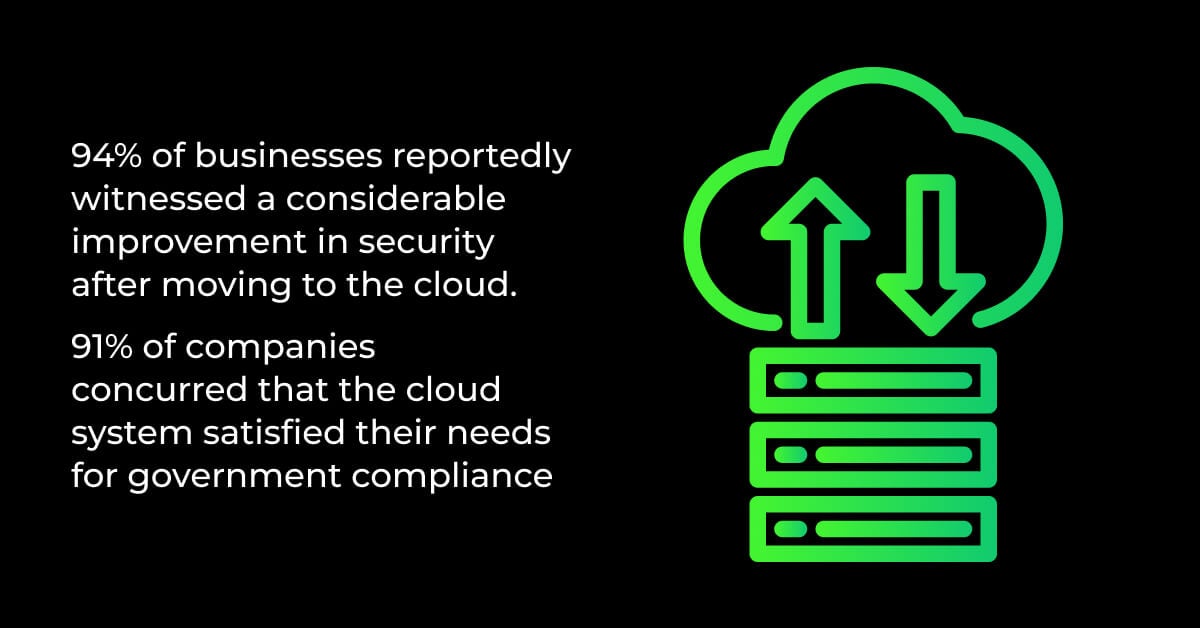In the world of technology, the benefits of cloud computing have become increasingly evident over the past two decades. According to research, 69% of companies currently use cloud technology, with an additional 18% planning to do so in the future. Investing in cloud computing, along with other tech innovations, can lead to income growth rates up to 53% higher than competitors. This underscores the increasing awareness among industry leaders of the advantages presented by cloud computing.

All these facts and numbers indicate that the cloud is concurrently providing a better time for industries to be a platform of choice.
Cloud computing has become the platform of choice for handling large applications in the public or private sector, especially for customer-facing ones requiring dynamic scaling or frequent changes. Enterprises have been using public clouds to introduce new technology before it is used elsewhere.
This paramount information lets us know that businesses of all sizes are migrating to cloud services. But if you’re still on the fence about moving to it, here are 14 essential benefits of cloud service you can’t afford to ignore.
14 Key Benefits of Cloud Computing
1. Omnipresence
Cloud is everywhere, and there is no escapism from it. Its universal nature makes functionality, trackable data, and transparency easily accessible. It allows diverse users to work together seamlessly on the same project. Working in the cloud concurrently by numerous individuals is manageable. As a result, it establishes a strong network while lowering costs. This, in turn, not only reduces cost but also builds a robust work model.
2. Data Security
One of the factors that give owners sleepless nights is data security. Cloud computing is one of the ways to alleviate stress. There have always been numerous viewpoints regarding the vulnerability of cloud-based platforms to hacking. However, the high level of data encryption in the cloud decreased the possibility of data hacking.
3. Cost saving
You are not alone if you are thinking about the cost associated with migrating to cloud computing. The initial cost of installing cloud-based servers worries 20% of business owners. However, if cloud computing is implemented correctly, the ROI procured during cloud adoption may outweigh the initial capital outlay. Therefore, moving to the cloud decreases the expense of maintaining and administering IT systems.
One of the best features of cloud computing is its “pay-as-you-go” business model, which does not require you to make a one-time investment. Pay for the feature you believe is practical for your work, and is necessary for your organizational setup. This ‘time and cost optimization’ approach has made the cloud a new favorite of CIOs. In fact, they have been enforcing it in almost every business facet.
4. Scalability
The scalability benefit of cloud computing is the ability to instantly scale up or down in response to changing conditions and needs. This refers to adjusting a system’s resource availability as and when necessary without materially altering its infrastructure. It requires the company to react swiftly to shifting customer expectations. Additionally, using the cloud frees up time for businesses to concentrate on managing their operations.
5. Mobility
Companies can use cloud connections to connect remotely using various devices, including laptops, iPads, and smartphones. Quick turnaround times, immediate solutions, and constant connectivity are made possible via remote accessibility. It is ideal for freelancers, remote employees, and businesses with branches in many cities and sectors.
6. Flexibility
Focusing more on the internal IT infrastructure can result in failure or subpar task execution.
Cloud is not limited to small bandwidths. Contrary to that, traditional internal technological infrastructure is more adaptable, allowing organizations to engage in last-minute modifications while working efficiently.
7. Collaboration
The data stored in a cloud helps the collaborating organizations communicate more quickly than with conventional techniques. A strong connection immediately opens up good business prospects and improves teamwork. When multiple individuals collaborate on the same project, accessing files from cloud computing becomes simple. With the cloud computing approach, it is possible to provide a safe way to share records with accountants or advisers.
8. Loss Prevention
When a company operates without a cloud computing solution, most of the data is saved in the local computer in the organization. Under such circumstances, the computer may permanently lose data if it becomes the victim of malicious software or spam mail.
There could be an instance where information is lost or stolen. Therefore, if a company doesn’t use a cloud system, there are several concerns related to the data. However, it is secure if the data is stored in the cloud. In addition, it provides convenient access via an internet connection even when the local computer is down.
9. Regular Software updates
It is quite a hassle to monitor the timely updates of the systems and software periodically. When it comes to the local systems, a manual update is required. However, that is also handled by the cloud. With cyclical upgrades and automatic software updates, users can concentrate their time and energy on work.
Manual upgrades in a company no longer need to be done by IT personnel. This saves time and money that would have been spent on third-party IT consultation.
10. Decrease in Carbon footprint
An organization’s sustainability depends mainly on identifying wastefulness and finding the right solutions to deal with the problems at every business level. The cloud system’s empowerment made it easier to install virtual objects than actual products and hardware. It paved the way for proactive digitalization-level improvement.
Cloud computing significantly reduces paperwork and computer emissions. After all, merely adding a recycling bin to your office won’t solve the present environmental catastrophe.
According to research, energy consumption was reduced by 31% between 2010 and 2020, supporting sustainability.
11. Disaster recovery
No matter how organized a company is, a small amount of unproductive downtime can have a negative effect. Disasters like power outages or other anticipated catastrophes can uphold a greater risk of “Loss of data.”
However, cloud-based services provide quick data recovery for emergency scenarios, from natural disasters to power outages.
12. Insight
Moving further into the digital era, the adage “Knowledge is power” changes due to the realization that “Data is money.” Several forms of information are concealed behind every customer transaction and business procedure. It becomes essential to recognize it and take appropriate action.
Access to that data will be easier using the appropriate cloud computing platform. Their products include data analysis, a bird’s eye view of the data, and cloud-based storage technologies. Tracking mechanisms are used to create bespoke reports.
13. Quality control
Poor quality and inconsistent reporting are the two factors that harm a business’s performance. All the files and data are kept in one place by the cloud-based application system in a single format. Since everyone may view the same file, the possibility of human discrepancy is reduced. This helps to maintain the data’s consistency and automatically saves various documents with several versions.
14. Competitive edge
Despite the growing popularity of cloud computing, only some people still choose to keep everything local. This increases the likelihood of losing to competitors who have access to cloud computing services. If a company adopts a cloud-based solution before its rivals, it will progress further in the learning process by the time they catch up.
Embracing the Benefits of Cloud Computing for Business
Cloud computing provides companies with increased scalability, accessibility, cost savings, and improved disaster recovery and security. These benefits allow companies to focus on their core business processes and improve overall efficiency. Hence, to improve on all fronts, businesses should choose cloud computing.
Hire our cloud architect to produce a customized business plan to integrate infrastructure, platform, security, and cyber resilience.
Concluding Insights: Future Impact and Benefits of Cloud Computing
Today, cloud computing is a crucial ingredient of every business. Businesses can choose the service they want to deploy based on size, technical requirements, and budget. Cloud computing enhances productivity, accelerates work, lowers risk, and aids in evaluating possible savings. Many businesses worldwide have benefited from cost savings and improved company operations because of cloud computing. As a result, cloud computing solutions meet the specific needs of developing companies.
At OpenXcell, we offer a broad spectrum of cloud management services to help you manage your business applications and streamline your most critical processes.
Get quick, safe, and scalable cloud solutions by employing our cloud management services.
Reach us at,
www.openxcell.com








